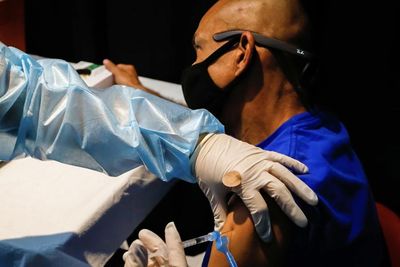People who are vaccinated against Covid-19 are less likely to spread the virus even if they become infected, a new study finds, adding to a growing body of evidence that vaccines can reduce transmission of the delta variant.
British scientists at the University of Oxford examined national records of nearly 150,000 contacts that were traced from roughly 100,000 initial cases. The samples included people who were fully or partially vaccinated with either the Pfizer-BioNTech or the AstraZeneca vaccines, as well as people who were unvaccinated. The researchers then looked at how the vaccines affected the spread of the virus if a person had a breakthrough infection with either the alpha variant or the highly contagious delta variant.
Both vaccines reduced transmission, although they were more effective against the alpha variant compared to the delta variant. When infected with the delta variant, a given contact was 65 percent less likely to test positive if the person from whom the exposure occurred was fully vaccinated with two doses of the Pfizer vaccine. With AstraZeneca, a given contact was 36 percent less likely to test positive if the person from whom the exposure occurred was fully vaccinated.
The risk of transmission from a breakthrough infection was much higher if someone had received just one dose of either vaccine.
The study was posted online Thursday and hasn't yet been peer reviewed. But scientists not associated with the research said the findings were credible."It's the highest quality study we have so far on the question of infectiousness of vaccinated people infected with delta," said Dr. Aaron Richterman, an infectious disease physician at the University of Pennsylvania, who was not involved in the research.
Susan Butler-Wu, a clinical microbiologist at the University of Southern California, called the study "well performed," especially because it reflects real-world transmission since it tracked spread among close contacts.
Using cycle threshold (Ct) values, the researchers found a similar level of viral load in unvaccinated and vaccinated people who were infected with the delta variant, backing up prior studies. Even so, people who were fully vaccinated were still less likely to infect others.
"Transmission is much more complex," Butler-Wu said, meaning the Ct value is just a snapshot in time and doesn't reflect the entire course of illness.It's likely that people who have been vaccinated clear the infectious virus from the body faster. A previous study from Singapore had found that although levels of the virus were initially the same in those infected with the delta variant regardless of vaccine status, by day seven, levels of the virus dropped quickly in those who were vaccinated, which may reduce the ability to spread illness.
There is emerging evidence that even though cycle threshold values may be the same regardless of vaccination status, people who are vaccinated may have less infectious virus in their bodies, potentially reducing transmission. Richterman pointed to a recent pre-printfrom China that found a large reduction in transmission in those who had received two doses of vaccine, compared to the unvaccinated.Vaccines have the ability to prevent transmission of the virus in two ways, he said. The first is by preventing infection altogether. The other is by reducing the amount of infectious virus should somebody get sick.
"People who have been vaccinated will have immune systems at the ready that can coat the virus in antibodies much more quickly than unvaccinated people who have to build up an immune response," Richterman said.
Protection against transmission wanes
The new study showed that protection against transmission seemed to wane over time, however. After three months, people who had breakthrough infections after being vaccinated with AstraZeneca were just as likely to spread the delta variant as the unvaccinated. While protection against transmission decreased in people who had received the Pfizer vaccine, there was still a benefit when compared with people who were unvaccinated.
Since antibody levels also tend to decrease over time after vaccination, a reduction in protection against transmission is to be expected, Richterman said.
"We know that the amount of antibodies circulating in the blood decreases over time after vaccination, even though the immune memory remains durably robust and is still able to prevent infections, particularly severe infection," he said. "These circulating antibodies that are immediately available probably play some role in preventing transmission if infected, so I don't think it's surprising to see some reduced protection against transmission over time."
Richterman and Butler-Wu agreed that while community transmission remains high, masks and testing remain important.
"We need to combine our vaccines with other measures to reduce how much virus we get exposed to by things like masking and testing," Butler-Wu said. "Additive measures is the name of the game here."
Richterman agreed.
"While there may be a level of vaccination coverage high enough where other interventions like masking and distancing aren't needed, we certainly aren't there yet in many parts of the U.S.," he said.
NBC News, By Akshay Syal, MD, October 1, 2021
###
October 25, 2021
Voices4America Post Script. This isn’t new news but it is worth repeating. Get vaccinated. Soon get your kids vaccinated. Keep yourself and others safe. #GetVaxxed
